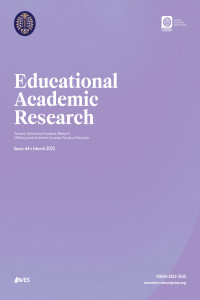İŞBİRLİKLİ ÖĞRENME ÇALIŞTAYININ FEN VE TEKNOLOJİ ÖĞRETMENLERİNİN MODELİ UYGULAMA
İşbirlikli öğrenme, Fen ve teknoloji Öğretmenleri, Ağrı ili
The Effect of The Cooperative Learning Workshop on Science and Technology Teachers’ Practice Level About This Model
___
- Aksoy, G. (2011). Öğrencilerin fen ve teknoloji dersindeki deneyleri anlamalarına okuma-yazma-uygulama ve birlikte öğrenme yöntemlerinin etkileri. Yayımlanmamış doktora tezi, Atatürk Üniversitesi Eğitim Bilimleri Enstitüsü, Erzurum.
- Aksoy, G. ve Doymuş, K. (2011). Fen ve teknoloji dersi uygulamalarında işbirlikli okuma-yazma-uygulama tekniğinin etkisi. Gazi Eğitim Fakültesi Dergisi, 31(2), 381-397.
- Avcıoğlu, H. (2012). The Effectiveness of Cooperative Learning and Drama Techniques in Acquisition of Social Skills by the Children with Intellectual Disabilities, Eğitim ve Bilim-Education and Science, 37(1), 110- 125.
- Boumer, J., Hughes, M. and Boumer, T. (2001). First – Year Undergraduate Experiences of Group Project Work, Assessment and Evaluation in Higher Education, 26, 19-39.
- Doymuş, K. (2007). Effects of a Cooperative learning strategy on teaching and learning phases of matter and one-component phase diagrams. Journal of Chemical Education, 84 (11), 1857-1860.
- Doymuş, K. (2007). Effects of a Cooperative learning strategy on teaching and learning phases of matter and one-component phase diagrams. Journal of Chemical Education, 84 (11), 1857-1860.
- Doymuş, K., Aksoy., G., Daşdemir, İ. ve Şimşek, Ü. (2006). Fen bilgisi laboratuarı uygulamalarında işbirlikçi öğrenme yönteminin kullanılması. Kazım Karabekir Eğitim Fakültesi Dergisi, 13,157-166.
- Doymuş, K., Karaçöp, A. and Şimşek, Ü. (2010). Effects of jigsaw and animation techniques on students’ understanding of concepts and subjects in electrochemistry. Educational Technology Research and Development, 58 (6), 671-691.
- Fer, S. ve Çırık, İ. (2006). Öğretmenlerde ve Öğrencilerde, Yapılandırmacı Öğrenme Ortamı Ölçeğinin Geçerlilik ve Güvenirlik Çalışması Nedir?. Yeditepe Üniversitesi Eğitim Fakültesi Dergisi. 2(1), 1-26.
- Garvin, J., Butcher, A, Stefani, A., Tariq, V., Lewis, N., Blumsom. R. Govier, R. and Hill, J. (1995). Group projects for first year university students: An evaıuation. Assessment and Evaluation in Higher Education, 20(3), 279-94.
- Graham, D.C. (2005). Cooperative learning methods and middle school students. Yayınlanmamış doktora tezi, Capella University, Minnesota.
- Hwang, W. Y., Shadiev, R., Wang, C. Y., and Huang, Z. H. (2012). Apilot Study of Cooperative Programming Learning Behaviour and Its Relationship with Students’ Learning Performance, Computers & Education, 58(4), 1267-1281.
- Johnson, D.W. and Johnson R.T. (1999). Making cooperative learning work. Theory Into Practice, 38(2), 67-73.
- Karasar, N. (2005). Bilimsel araştırma yöntemi. Ankara: Nobel Yayın Dağıtım.
- Küçükahmet, L. (1997). Eğitim Programları ve Öğretim, Ankara: Gazi Yayınevi.
- Maloof, J. and White, V.K.B. (2005). Team study training in the college biology laboratory. Journal of Biological Education, 39 (3), 120-125.
- Mills, P. (2003). Group project work with undergraduate veterinary science students. Assessment and Evaluation in Higher Education, 28(5), 527- 38.
- Özden, Y. (1997). Öğrenme ve Öğretme, Ankara: Pegem Yayıncılık.
- Slavin, R.E., Madden, N.A. Karweit, N., Livermon, B.J. and Dolan, L. (1995). Success for all: first year outcomes of a comprehensive plan for reforming urban education. American Educational Research Journal, 27, 255- 278.
- Sönmez, V. (2000). Öğretmenlik mesleğine giriş. Ankara: Anı Yayıncılık.
- Şimşek, Ü. (2007). Çözeltiler ve kimyasal denge konularında uygulanan jigsaw ve birlikte öğrenme tekniklerinin öğrencilerin maddenin tanecikli yapıda öğrenmeleri ve akademik başarıları üzerine etkisi. Yayımlanmamış doktora tezi, Atatürk Üniversitesi Fen Bilimleri Enstitüsü, Erzurum.
- Tan W., Wen, X., Jiang, C., Du, Y., and Hu, X. (2012). An Evulation Model Integrating User Trust and Capability for Selection of Cooperative Learning Partners, Chinese Journal of Electronics, 21(1), 42-46.
- Tolmie, A. K., Topping, K. J., Christie, D., Donaldson, C., Howe, C. J., Jessiman, E., Livingston, K.. and Thurston, A. (2010). Social effects of collaborative learning in primary schools. Learnig Instruction, 20(3), 177-191.
- Turan S., Konan A., Kihy Y. A.,Özvarış S. B., and Sayek I. (2012). The Effect of Problem- Based Learning with Cooperative – Learning Strategies in Surgery Clerkships, Journal of Surgical Education, 69(2). 226-230.
- Webb, N. M., Sydney, H. and Farivor, A.M. (2002). Theory in to practice, College of Education, 41(1), 13-20.
- Başlangıç: 2003
- Yayıncı: Atatürk Üniversitesi
GÜRCÜ KRALİÇESİ TAMARA’NIN SARIKAMIŞ Micingert SAVAŞI
İŞBİRLİKLİ ÖĞRENME ÇALIŞTAYININ FEN VE TEKNOLOJİ ÖĞRETMENLERİNİN MODELİ UYGULAMA
MALLARMEE’NİN ŞİİRLERİNDE RENK ANLATIMLARI
Sadık TÜRKOĞLU, Deniz KÜZECİ, Melik BÜLBÜL
Yabancı Dil Olarak Fransızcanın Öğretiminde Molière’in Cimrisi
EDEBİ BİR TÜR OLARAK FABL YOLUYLA DİL ÖĞRETİMİ
Melik BÜLBÜL, Sadık TÜRKOĞLU, Deniz KÜZECİ
ÇOCUKLARA YABANCI DİL ÖĞRETİMİNDE EYLEMSEL YAKLAŞIM
Mehmet KÖK, Cem ASLAN, Cem ASLAN
HENRY DE MONTHERLANT’IN ÖLÜ KRALİÇE LA REİNE MORTE ADLI PİYESİNDE ÖLÜM KORKUSU VE ŞİDDETİN HIZI
